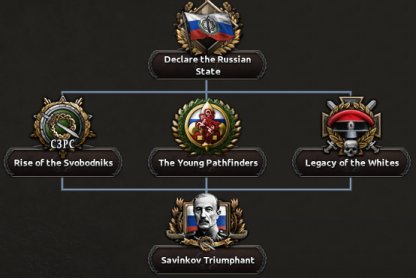

In short order, Chernov was President, and Iraklij Tsereteliy, leader of the Menshiviks, became Prime Minister. The other 30% was mainly the Kadets, part of the old coalition, with the Right Social Revolutionaries ceasing to exist. Together with the Menshiviks, less radical cousins of the Bolshiviks, they formed a coalition government with a 70% majority. Representitives defected in droves to Chernov's Left Social Revolutionaries. We can, and will, continue to make this republic work." We can prove to ourselfs and to our children that the Russian people are not weak and do not run away from a challenge. Together, we can all carry on the Republic in Kerensky's memory. Who will lead us through the trying trials of democracy now? The answer is simple.

Our fearless leader of nearly twenty years is now gone. "My fellow representitives: Our Republic faces a great crisis. They were not, however, prepared for Viktor Chernov's speech. Most representitives already knew of the assassination before they arrived that morning, having been informed by the police, and were well prepared for heated debate. The crisis happened at a time when the Duma was still in session. While the death of Kerensky was tragic for the Republic, there was still a stroke of good luck. Kerensky tried to utter some last words, but his jaw was shattered, and within a minute, the great leader of Russia was dead. Kerensky opened the door and slumped against the pavement, even as a nearby police officer gunned down the attacker. The last two simply grazed his leg, but the deed was done. The first shot struck Kerensky in the jaw. At the first stop sign, a lone gunman walked up to the window, and fired four shots from a pistol. Kerensky got into his state vehicle, and the driver pulled them out onto the street. Still, it was not good to be out on the streets late at night, even in Moscow. Despite all the troubles, the army was actualy shaping up a bit. He had a 10:30 apointment with Marshal Denikin to observe new night fighting manuvers. It was simply his duty to Russia to do his best to keep it intact. Kerensky quickly banished such thoughts, he never liked to take credit for the Republic. The force of his idealism and patriotism inspired Russians, young and old, to support the Republic. It occured to him, that maybe, just maybe, he was the only thing holding the Republic together was himself. It still amazed Kerensky that Siberia was still obeying the central authority, well, sometimes. Despite nearly twenty years of republican rule, Russia was still in shambles. The cold of winter always reminded him of how delicate the position of the Russian Republic was. President Kerensky looked out over Moscow from the window of his state room, a look of sadness on his face.


 0 kommentar(er)
0 kommentar(er)
